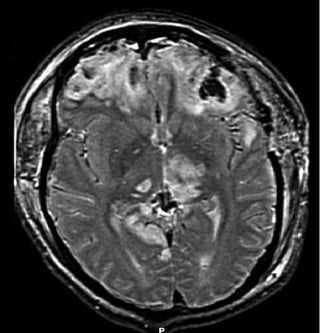According to the Centers for Disease Control and Prevention 153 people in the U.S. die from injuries that include a traumatic brain injury (TBI) every day. Currently, there are no effective treatments for moderate-to-severe TBIs. So those who do survive their injuries often live the rest of their lives with impaired thinking, memory, or movement. TBIs can also lead to personality and emotional changes. However, research being conducted at the University of Georgia, Athens (UGA) might lead to a treatment that could significantly improve the prognosis of those with brain injuries. This promising research into a glue-like substance for the brain recently won a $1.5 NIH grant award.

(MRI of patient with brain trauma courtesy of Wikimedia Commons)
How this Brain Glue Works:
In order to address the existing gap in TBI treatment, Lohitash Karumbaiah assistant professor in UGA's College of Agricultural and Environmental Sciences, proposes to deliver Neural Stem Cells (NSCs) in selectively engineered glycomaterial carriers that can preserve the undifferentiated state of NSCs to promote brain tissue repair. By doing so, he and his team hope to promote functional recovery after TBI. The Brain Glue is a hydrogel matrix with a gelatin-like consistency that works as a scaffolding for transplanted stem cells. With the unique ability to take the shape of the void left in the brain after a severe trauma, the Brain Glue will enable a more natural healing environment for stem cells to colonize and regenerate. These stem cells, in turn will then be capable of repairing damaged tissue.
"It's very common with these invasive injuries that surgeons will actually remove the part of the dead brain leaving behind a cavity or hole," said Karumbaiah in an article for UGA News. "The question is, then, can you replace that with something like our Brain Glue, loaded up with compounds native to the brain together with a mix of protective agents that can be incorporated for the best therapeutic outcome.”
Dr. Karumbaiah, led the team that designed and created Brain Glue. The main difference between Brain Glue and other synthetic hydrogels, according to the same article, is the variety of possibilities to trap neural stem cells, improve integration and reduce the likelihood of rejection.
This process has already proven successful in rats. The scientists believe that that fibroblast growth factor (FGF2) enriching chondroitin sulfate glycosaminoglycan (CS-GAG) matrices maintain the undifferentiated state of neural stem cells (NSCs). This facilitates brain tissue repair sub acutely post-TBI. Rates with traumatic brain injuries were given injections with CS-GAG matrices alone or with CS-GAG matrices containing Brain Glue (PKH26GL labeled allogeneic NSCs). Brain tissue four weeks later showed the significantly enhanced tissue protection in CS-GAG treated animals when compared to TBI only control, and NSC only treated animals. CS-GAG-NSC treated animals demonstrated significantly enhanced FGF2 retention, and maintenance of PKH26GL labeled NSCs.
What’s Next:
Traumatic Brain Injuries (TBIs) result in a range of complex neurophysiological and functional deficits, severe long-term disability, and poor prognosis for the affected individuals. Steven Stice, director of the Regenerative Bioscience Center at UGA, is working with Karumbaiah on a licensed technology for commercialization of the new Brain Glue.
The $1.5 million in research funding from the NIH will allow Karumbaiah to continue working toward a viable treatments. Along with his work on the Brain Glue, he will investigate how neural networks form and change in response to traumatic insults. These studies will focus on the therapeutic use of electrical stimulation to help return loss of function in any given region of the brain. "Multiple methods are needed in these kinds of studies," said Karumbaiah.
Researchers at UGA to Meet with Lab Suppliers at Bioresearch Product Faire:
Those wishing to increase their laboratory product sales in the coming years should plan on at The 19th Annual BioResearch Product Faire™ at the University of Georgia will be held on March 14th, 2018. This is a great opportunity laboratory equipment suppliers to display their products and meet face to face with the well funded researchers at UGA to discuss their needs.
Those wanting to display and demonstrate their latest lab or chemical supply products can call (530) 272-6675 or click the link below for more information.
Life science professionals attend for free. Click the button below for additional information or to pre-register.




